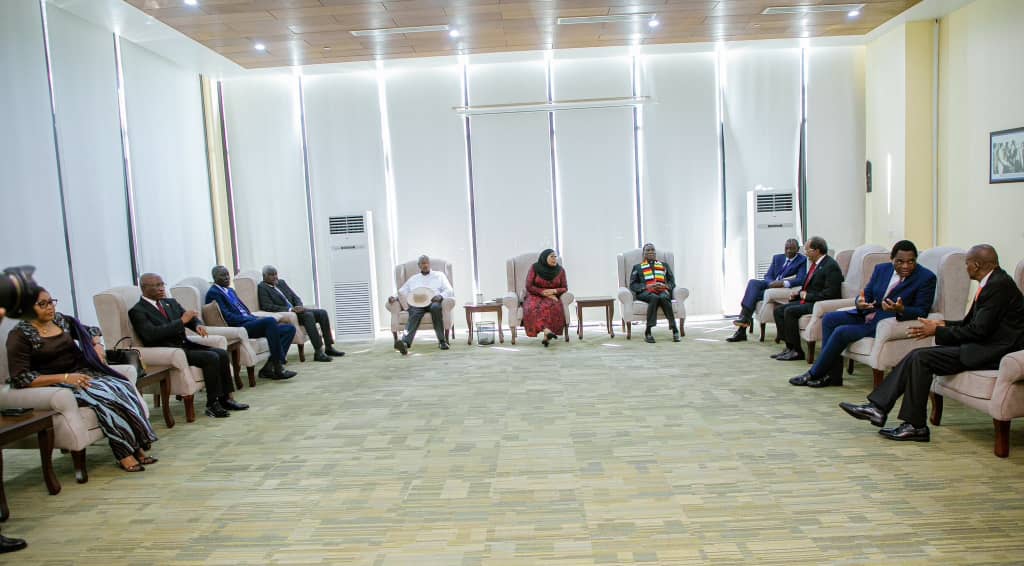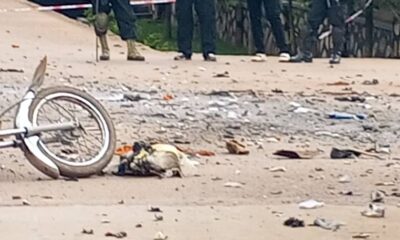Published
4 months agoon
By
Ugdiplomat
The East African Community (EAC) and the Southern African Development Community (SADC) convened an urgent joint summit in response to the worsening security crisis in the Democratic Republic of the Congo (DRC). The high-level meeting, which brought together heads of state and government from both regional blocs, aimed at forging a unified approach to resolving the escalating conflict in eastern DRC while also strengthening regional economic integration and cooperation.
The summit was called amid mounting violence in eastern DRC, where armed militias, including the M23 rebel group and various other non-state actors, continue to wreak havoc on civilian populations. The deteriorating security situation has resulted in mass displacements, humanitarian crises, and rising tensions between regional states, threatening to destabilize the entire Great Lakes and Southern Africa regions.
During the closed door meeting, leaders expressed deep concern over the increasing attacks on civilians, the proliferation of illegal armed groups, and external interference in the conflict. They reaffirmed their commitment to restoring peace and security in the DRC through a coordinated regional response.
“The situation in the eastern DRC is unacceptable. It is our collective responsibility as regional leaders to ensure peace, security, and stability for our people,” one of the heads of state remarked during the deliberations.
The summit condemned all acts of violence and called for the immediate cessation of hostilities, the withdrawal of armed groups, and the restoration of state authority in affected areas.
To address the escalating conflict, the summit agreed to enhance intelligence-sharing, deploy joint peacekeeping efforts, and strengthen diplomatic engagement with all parties involved. Leaders called for strict enforcement of previous peace agreements, including the Luanda and Nairobi processes, which outline pathways for conflict resolution.
A key resolution was the proposal to intensify diplomatic mediation between the DRC government and armed groups, alongside increased pressure on external actors believed to be fueling instability in the region. The leaders also urged international partners, including the African Union and the United Nations, to provide additional support for regional peacekeeping initiatives.
Beyond security concerns, the summit addressed how the ongoing instability in the DRC is disrupting trade routes, stalling economic development, and threatening regional integration efforts. The DRC, which joined the EAC in 2022, serves as a crucial trade and resource hub, making stability in the country essential for regional economic growth.
Leaders emphasized that without peace, economic progress cannot be achieved. The summit called for coordinated efforts to restore trade routes, secure supply chains, and facilitate cross-border investments.
“The crisis in DRC is not just a security issue; it is an economic issue. A stable Congo means a thriving East and Southern Africa,” a senior official noted.
The EAC and SADC blocs reiterated their commitment to implementing the African Continental Free Trade Area (AfCFTA) agreement, pledging to eliminate trade barriers, enhance infrastructure development, and create a seamless business environment across borders.
Another pressing concern raised at the summit was the humanitarian catastrophe unfolding due to the displacement of thousands of Congolese civilians. The conflict has forced entire communities to flee their homes, seeking refuge in neighboring countries such as Uganda, Rwanda, Burundi, and Tanzania, putting immense pressure on host nations.
The summit called for urgent humanitarian assistance, increased international support for displaced persons, and strengthened mechanisms to ensure the safety of refugees.
In addition to the immediate crisis, leaders also discussed the need for sustainable development, climate resilience, and food security across the two regions. Recognizing that conflicts are often exacerbated by competition over resources, they emphasized investments in agriculture, renewable energy, and digital infrastructure to promote long-term economic stability.
The summit concluded with a strong call for unity, urging all member states to work together in addressing both the immediate security threats in the DRC and the broader challenges affecting regional stability.
Key action points include:
The EAC and SADC leaders made it clear that the time for passive diplomacy is over—action must be taken to prevent further deterioration of the situation in the DRC. They called upon the African Union, the United Nations, and global partners to support Africa-led solutions to the crisis, rather than imposing external interventions.
The outcomes of this emergency summit will be closely monitored, with a follow-up meeting scheduled to assess progress on security measures and economic recovery efforts. Member states were urged to implement the agreed-upon resolutions swiftly to prevent further escalation.


UAE’s Aster DM Healthcare to Donate Hitech Mobile Medical Clinic to Uganda


Terror Plot Foiled! UPDF Kills Two Terrorists With Explosives In Munyonyo


International Contact Group Welcomes DRC-Rwanda Declaration, Calls for Immediate Ceasefire and Respect for Territorial Integrity


Dr. Lumumba Calls for Socioeconomic Integration and Border Reforms at Kenya’s Madaraka Day Celebrations


REVEALED! NRM Honchos Position Selves as Museveni Prepares National Election Taskforce


SUPER GLUE! Fear As NRM Aspirants Delay To Facilitate Influencers
